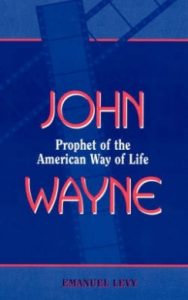Arguably, one of the most strained working interactions John Wayne had ever had with a Hollywood director was with John Huston while making The Barbarian and the Geisha, one of his most embarrassing films.
C- (* out of *****)
| The Barbarian and the Geisha | |
|---|---|

Theatrical release poster
|
|
Despite good intentions on Huston’s part, Wayne was miscast as Townsend Harris, America’s first diplomatic representative to Japan. Huston believed that “only one man is right for him and that’s John Wayne,” his idea being that “his massive frame, bluff innocence and rough edges would be an interesting contrast to the small, highly cultivated Japanese; that the physical comparison would help serve to emphasize their dissimilar viewpoints and cultures.” Wayne was the best choice, Huston felt “to symbolize the big, awkward United States” of the past.
Wayne was the kind of actor who needed to trust his directors, but he lost his faith in Huston. And this time, he was uncharacteristically vocal about his dissatisfaction, complaining about the script and his role, which he thought damaged his image.
In one particularly unappealing scene, Wayne was thrown to the ground–with ease–by a tiny judo expert and was left sitting there with a bewildered look. He feared that his fans would not take it: “Huston made me walking through a series of Japanese pastels. Hell, my fans expect me to be tall in the saddle!”
If you want to know more about John Wayne’s career and life, please read my book:
Wayne told reporters that “the most successful films I have made have been about people, not plots and backgrounds,” and that he was “surprised at Huston’s attack, that all-out go for sheer beauty like a Japanese print.” “I’ve endured a lot of bad scripts and bad directors,” he said, but “the time comes when you gotta speak up.” He admitted that “for a while I couldn’t make up my mind whether to flat quit and go home and let them sue me, or stay and give this thing a whirl. Guess I’m in so deep now I can’t back out–but the Old Duke’s not happy.” A consummate professional, he felt the contract was binding, but he never worked again with Huston again.
Most of Wayne’s fears were confirmed when the film was released. Bosley Crowther represented many reviewers when he wrote in the N.Y. Times: “John Wayne in the role of Harris appears a little bewildered and repressed, being much more accustomed to action.” And other critics were even harsher, on the film and on Wayne’s performance.
The Barbarian and the Geisha was also a failure at the box-office, grossing in rentals only $2.5 million; it cost over $4 millions.
One of the major problems was the scenario, by Huston and Charles Grayson, which was unfinished when shooting began. “I found myself shooting in the daytime and writing future scenes at night,” Huston writes in his memoirs. Later, Huston learned through a trade paper that Twentieth Century-Fox changed the film’s title, The Townsend Story, to The Barbarian and the Geisha, a title he never liked.
Nor did Wayne, fearing it was not sufficiently explained to the audience that the Japanese call foreigners barbarians, not just his character. “It was a good picture before it became a bad picture,” Huston claimed, still believing he made “a sensitive, well-balanced work.” He admits to making “pictures that were not good, for which I was responsible, but this was not one of them.” Huston suspects that Wayne took over after he left, because “he pulled a lot of weight at Fox, so the studio went along with his demands for changes.” By the time, “the studio finished hacking up the picture according to Wayne’s instructions, it was a complete mess,” and by the time Huston saw it, “I was aghast.”
Huston considered taking legal steps to have his name removed from the picture, but upon learning that Buddy Adler, the producer, was terminally ill with a brain tumor, bringing suit under such circumstances “was unthinkable.”
Cast
John Wayne as Townsend Harris
Eiko Ando as Okichi
Sam Jaffe as Henry Heusken
Sō Yamamura as Governor Baron Tamura
Fuyukichi Maki as Peasant
Norman Thomson as Ship captain
James Robbins as Lt. Fisher
Morita as Prime Minister
Kodaya Ichikawa as Daimyō
Hiroshi Yamato as the Shōgun
Credits:
Directed by John Huston
Produced by Eugene Frenke
Written by Ellis St. Joseph (story)
Screenplay by Charles Grayson, Nigel Balchin, James Edward Grant, Alfred Hayes
Narrated by Eiko Ando
Music by Hugo W. Friedhofer
Cinematography Charles G. Clarke
Edited by Stuart Gilmore
Distributed by 20th Century Fox
Release date: September 30, 1958 (U.S.)
Running time: 105 minutes
Budget $3,495,000











